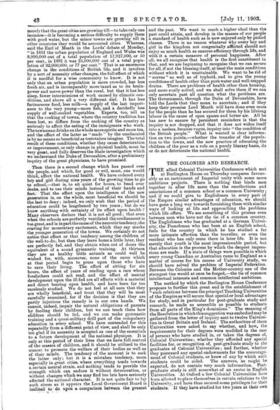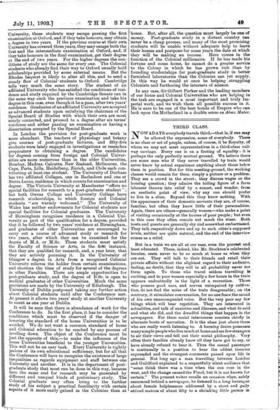THE COLONIES AND RESEARCH.
THE allied Colonial Universities Conference which met at Burlington House on Thursday compares favour- ably as an instrument of Imperial unity with some more ambitious projects. There is nothing that binds men together in after life more than the recollections and associations of a common school or a common University ; and if we could give to Englishmen in every part of the Empire similar advantages of education, we should have gone a long way towards furnishing them with similar ways of looking at life and approaching the problems which life offers. We see something of this process even between men who have not the tie of a common country. The Englishman who has graduated at a German Univer- sity; the Frenchman who has been at an English school, feels for the country in which he has studied a far more intimate affection than the traveller, or even the resident who has only come there in later life. It is not merely that youth is the most impressionable period, but that education is the process by which the deepest impres- sions are made. If a state of things were possible in which every young Canadian or Australian came to England as a matter of course for his course of University study, we should have solved the problem of Imperial Federation. Between the Colonies and the Mother-country one of the strongest ties would at once be forged,—the tie of common intellectual interests and common intellectual ambitions.
The method by which the Burlington House Conference proposes to further this great end is the establishment of " such relations between the principal Teaching Universities of the Empire as will secure that special or local advantages for study, and in particular for post-graduate study and research, be made as accessible as possible to students from all parts of the King's dominions." The meaning of the Resolution in which this suggestion was embodied may be gathered from the letter of inquiry sent to twelve Universi- ties in Great Britain and Ireland. The authorities of these Universities were asked to say whether, and how, the requirements for their degrees were modified in the case of persons who have studied in, or taken the degrees of, Colonial Universities ; whether they afforded any special facilities for, or recognition of, post-graduate study to the graduates of Colonial Universities ; and further, whether they possessed any special endowments for the encourage- ment of Colonial students, or knew of any by which such students could be aided. The answers, as might be expected, do not contain very much information. Post- graduate study is still somewhat of an exotic in English Universities. 'At Oxford a few Colonial Universities have b3en allowed to place themselves in certain relations to the University, and have thus secured some privileges for their students. It they have studied for two years at their own University, these students may escape passing the first examination at Oxford, and if they take honours, may obtain a degree in two years. If the previous course at their own University has covered three years, they may escape both the first and the intermediate examination at Oxford, and, if they take honours in the final examination, get their degree at the end of two years. For the higher degrees the con- ditions of study are the same for every one. The Colonial . students who find their way to Oxford usually hold scholarships provided by some external means.- But the Rhodes bequest is likely to alter all this, and to send a steady flow of Colonial- students to Oxford. Cambridge tells very much the same story. The student of an affiliated University who has satisfied the conditions of resi- dence and study required by the Cambridge Senate can in the same way oniit the previous examination and take his degree in this case, even though it be a pass, after two years' residence. Graduates of an affiliated University are accepted as advanced students upon satisfying the chairman of the Special Board of Studies with which their own are most nearly connected, and proceed to a degree after six terms' residence and either passing an examination or having a dissertation accepted by the Special Board.
In London the provision for post-graduate work is more abundant. The teachers of physiology and botany give eourses of post-graduate lectures, and fifty-five students were lately engaged in investigations or reseaches preparatory to obtaining a degree. The candidates for degrees coming from foreign and Colonial Univer- sities are more numerous than in the older Universities, Bombay, Madras, Calcutta, New Zealand, Melbourne, the Cape, Paris, Lille, Heidelberg, Zurich, and Chile each con- tributing at least one student. The University of Durham has two affiliated Colleges, one in Barbadoes and one at Sierra Leone, residence in which counts for examination and degree.. The Victoria University at Manchester " offers no special facilities for research to a post-graduate student " ; but both Owens College and University College have research studentships, to which foreign and Colonial students " are warmly welcomed." The University of Wales has neither endowments for Colonial students nor special facilities for Colonial graduates. The University of Birmingham recognises residence in a Colonial Uni- versity as part of the qualification for a degree, provided that it be followed by two years' residence at Birmingham, and graduates of other Universities are encouraged to carry out a course of advanced study or research for two years, after which they can be examined for the degree of M.A. or M.Sc. These students must satisfy the Faculty of Science or Arts, in the first instance, that they are qualified for research, and, a year later, that they are actively pursuing it. In the University of Glasgow a degree in Arts from a recognised Colonial University relieves the holder from certain examinations, and shortens the time of study for several of the degrees in .other Faculties. There are ample opportunities for post-graduate study, and the degree of B.Sc. is open to medical graduates of other Universities. Much the same provisions are made by the University of Edinburgh. The University of Dublin postponed taking any further action about Colonial students until after the Conference met. At present it allows two years' study at another University to count as one year at Dublin.
It will be seen that there is abundance of work for the Conference to do. In the first place, it has to consider the conditions which must be observed if the danger of lowering the standard of the home Universities is to be avoided. We do not want a common standard of home and Colonial education to be reached by any process of levelling down. The object of the Conference must be just the opposite of this,—to make the influence of the home Universities beneficial to the younger Universities. This will not be an easy task. Every University is rightly jealous of its own educational sufficiency, but for all that the Conference will have to recognise the existence of large inequalities as regards equipment and staff between one University and another. It is in the department of post- graduate study that most can be done in this way, because here the same zeal for research may be generated by different and unequal kinds of preliminary study. The Colonial graduate may often bring to the further study of his subject a practical familiarity with certain aspects of it more easily gained in the Colonies than at home. But, after all, the question must largely be one of money. Post-graduate study in a distant country. can `never be a cheap process, and many of the most promising students will be unable without adequate help to leave their homes and postpone for some years the date at which they will be making an income. Here comes in the 'function of the Colonial millionaire. If he has made his fortune and come home, he cannot do a greater service to the Colony in which he has grown rich than by , founding studentships for post-graduate study in better furnished laboratories than the Colonies can yet supply. In this way he would at once be helping :struggling Colonists and furthering the interests of science.
In any case, Sir Gilbert Parker and the leading members of our home and Colonial Universities who are helping in the task are engaged in a most important and truly. Im- perial work, and we wish them all possible success in it. He is sure to be one of the best bonds of Empire who can look upon the Motherland in a double sense as Alma Mater.







































 Previous page
Previous page